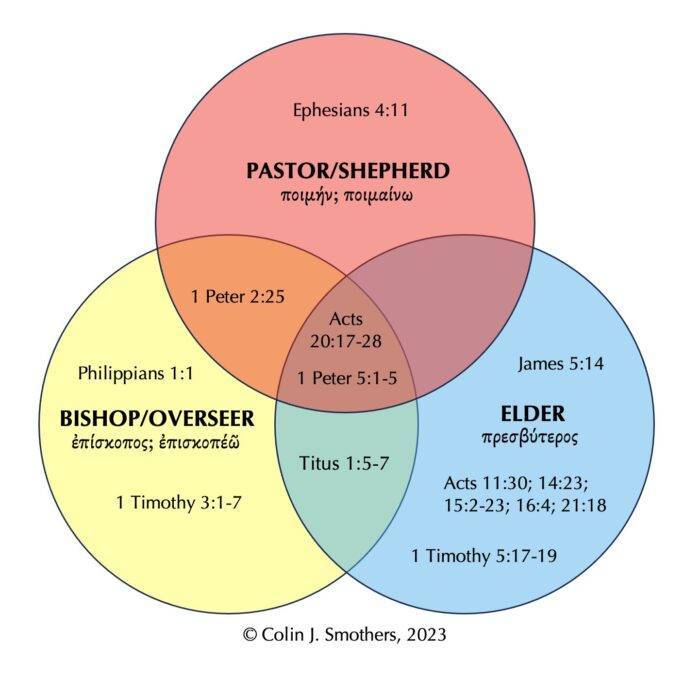Pastor, Elder, and Bishop: What’s the Difference?
How should you refer to your church leader? Most of us use the term pastor, but some use the term elder and even bishop. If you are confused by these different denominational terms you are not alone. A bishop is typically equated with Catholic or Eastern Orthodox churches, although Anglican and a few Lutheran churches also use the term. The term elder is often associated with the Mormon church and the young men you meet in ties on your front porch, though more evangelical churches are utilizing the term elder now. For most people, the term pastor is an easily-recognizable term referring to the spiritual leader of a church.

The Biblical Evidence
As far as personal history, I grew up in a Baptist church that had a pastor, an assistant pastor, and a deacon board that made church leadership decisions. It was not until high school that I was introduced to the idea of elder. I began to study what the Bible had to say about church leadership, and what I found was quite a bit different that what most churches practice.
The Term Elder in the Bible
The word for elder (presbuteros, πρεσβύτερος) is the most common NT term in reference both to leaders of the Jewish community (e.g., Matt 15:2) as well as the church (e.g., James 5:14; 1 Peter 5:1). Elder is often a generic reference to an older man (1 Tim 5:1), and because of the fact that age implies wisdom (cf. Job 12:12), it is a natural leadership term.
The Term Bishop in the Bible
The word for bishop (episkopos, ἐπίσκοπος) is used significantly less than elder (10x total). Because of the unavoidable connotations of the word bishop, this word is usually translated as overseer by modern English translations. In contrast to the idea of elder, the word for bishop/overseer communicates the role or responsibility of oversight, much like we think of the role of a guardian.
The Term Pastor in the Bible
The word for pastor (poimen, ποιμήν) simply means shepherd. Although not used as much as elder, it is used in significant passages which describe church leaders (cf. Eph 4:11; Acts 20:28; 1 Pet 5:2). It is used mostly in the verbal form, putting the stress on act of shepherding.
Pastor, Elder, Bishop: One Office, Three Roles
Although many denominations create hierarchical structures by utilizing some of these terms, I would argue that, according to Scripture, the three terms elder, bishop/overseer, and pastor turn out to be interchangeable and refer to the same individual. Three passages in particular demonstrate this.
In Acts 20:17-38 we see a beautiful reunion between Paul and the elders of the church of Ephesus (20:17). While talking to the elders of Ephesus, Paul reminds them that God has made them bishops/overseers (Acts 20:28a), and their task is to shepherd (“to care for,” ESV) the church of God (Acts 20:28b). Thus, all three terms: elder, bishop/overseer, and pastor are used to refer to the same group in Acts 20.
Similarly, 1 Peter 5:1-2 records Peter’s instructions to the elders of the church. They are to shepherd the flock (5:2a), and exercise oversight (5:2b). Again, Peter uses all three terms to describe the role of the elder in the church.
Finally, Titus 1:5-9 describes the qualifications of an elder (cf. 1 Timothy 3:1-7). In Titus 1:5 they are broadly introduced as elders, but in Titus 1:7 the individual is described as a bishop/overseer. Again, the terms seem to be interchangeable.
I think the visual representation of how these passages work together is well represented by Colin Smothers’ Ven diagram.

In contrast to the complicated hierarchies of some denominations, if we pay close attention to the biblical data, I would propose that the terms elder, bishop/overseer, and pastor refer to the same office of church leader and are interchangeable. The term elder emphasizes the general nature of church leadership being one of maturity and wisdom, the term bishop/overseer references the function of the church leader being one who oversees the church, and the term pastor (i.e., shepherd) refers to the method or process by which the leader leads the people of God.
So what should you call your church leader? Feel free to call him bishop, or pastor, or elder. They are technically all one in the same.